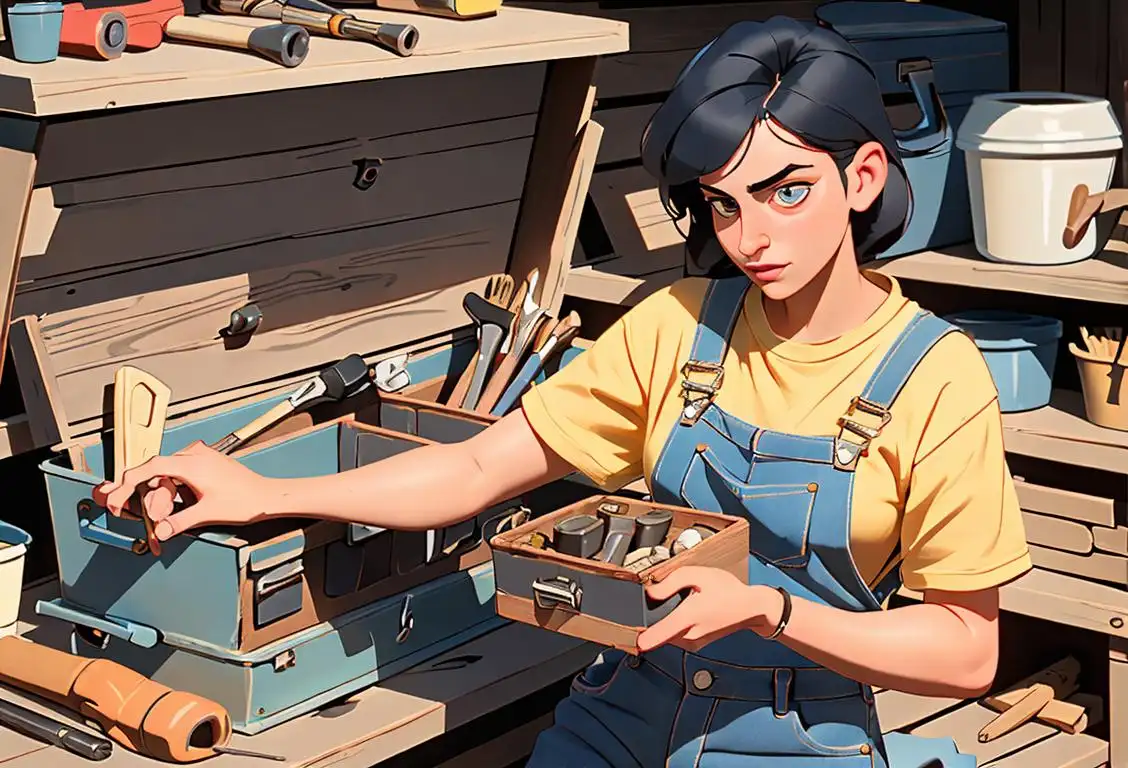National Worship Of Tools Day

Welcome to the fascinating world of National Worship of Tools Day! This unique holiday is all about celebrating and appreciating the tools that help us in our daily lives. Whether you're a DIY enthusiast, a professional handyman, or someone who simply appreciates a well-equipped toolbox, this day is for you. So, grab your wrenches, power drills, and hammers, because we're about to embark on a tool-tastic journey!
When is Worship Of Tools Day?
It's national worship of tools day on the 11th March.
The Origins of National Worship of Tools Day
Although the exact origin of National Worship of Tools Day remains somewhat of a mystery, one thing is for sure – it recognizes the importance of tools and pays homage to their usefulness. It's a day to honor those trusty companions that help us tackle various projects and fix things around the house.
Tools have played an essential role in human history, allowing us to build civilizations, conquer challenges, and get things done efficiently. From the earliest stone tools used by our ancestors to the modern-day power tools, these instrumental inventions have shaped the world we live in.
But why worship tools? Well, worship might be a strong word here, but it symbolizes the deep appreciation we have for these incredible gadgets that make our lives easier. National Worship of Tools Day encourages us to take a moment and acknowledge the significance of these everyday heroes in our lives.
How to Celebrate National Worship of Tools Day
Celebrating National Worship of Tools Day is as simple as it sounds – show your tools some love! Here are a few fun ways to honor your trusty companions:
- Organize your toolbox: We all know how frustrating it is to search for a specific tool when they're just piled up in a jumble. Take this day as an opportunity to organize your toolbox and give each tool its rightful place.
- Learn a new skill: Expand your tool-related repertoire by learning a new DIY skill. Whether it's woodworking, plumbing, or electrical work, there's always something new to discover.
- Upgrade your tools: Treat yourself to a shiny new tool that you've been eyeing for a while. It's a great way to celebrate the day and make your future projects even more enjoyable.
Did You Know?
Did you know that the most popular tool in the world is the humble hammer? Its versatility and timeless design make it a go-to tool for various tasks. So, next time you're swinging a hammer, remember you're part of a long and proud tradition of tool-wielders!
History behind the term 'Worship Of Tools'
5000 BCE
Early Tool Usage
Humans have been using tools for thousands of years, with evidence of early tool usage dating back to around 5000 BCE. These primitive tools were essential for survival as early humans relied on them for hunting, gathering, and constructing shelters. Tool making and utilization represented an important milestone in human evolution.
Ancient Times
Emergence of Human-Tool Relationship
From the earliest days of human civilization, tools have played a crucial role in human survival and development. Tools enabled our ancestors to manipulate their environment, making tasks easier and expanding their capabilities. This symbiotic relationship between humans and tools set the foundation for the worship of tools.
3000 BCE
Emergence of Craftsmanship
As civilizations began to form, individuals with specialized skills in toolmaking emerged. The art of crafting tools became more refined, allowing for the creation of more complex and efficient implements. This period marked the beginning of a deeper appreciation for the craftsmanship and functional value of tools.
3000 BCE
Ancient Egyptian Tool Worship
In ancient Egypt, tools held significant spiritual and religious importance. Egyptians worshipped a wide range of gods and goddesses associated with various tools. For example, Ptah, the patron god of craftsmen, was revered as the creator of all tools. The Egyptians believed that by honoring these deities, their tools would gain divine power and be more effective in their tasks.
1200 BCE
Ancient Egyptian Worship of Tools
In Ancient Egypt, tools held immense significance in both daily life and the afterlife. Egyptians believed that their deities and pharaohs required tools in the afterlife just as they did in the mortal realm. This belief led to the development of a ceremonial and religious reverence for tools, with elaborate rituals dedicated to their worship.
5th Century BCE
Greek Philosophy of Technē
The ancient Greeks had a philosophical concept called 'Technē,' which encompassed not only the mechanical arts but also the deeper understanding and skill required to use tools effectively. This philosophical approach elevated the act of using tools to an art form. It emphasized the importance of mastery and craftsmanship, leading to a deep respect for tools and their creators.
700 CE
Japanese Tradition of Tool Appreciation
In medieval Japan, a cultural practice called 'kogei' emerged, which focused on the appreciation and veneration of crafted objects, including tools. Tools that displayed exceptional artistry and functionality were highly valued and celebrated as works of art. This tradition fostered a deep respect for tools as more than mere practical instruments.
Middle Ages
Christian Patron Saints of Crafts
During the Middle Ages, Christianity influenced the perception of tools through the veneration of patron saints associated with specific crafts. Artisans and craftsmen would pray to these patron saints for guidance and assistance in their work. For example, Saint Eligius, the patron saint of goldsmiths and metalworkers, was believed to intercede on behalf of those working with tools.
18th Century
Industrial Revolution and Tool Worship
The Industrial Revolution brought about a shift in the perception of tools. As machines and factories came to dominate production, tools became symbols of progress and innovation. They represented the power and potential of human creativity and industrial advancement. The ideology of tool worship extended beyond craftsmen, shaping the broader cultural ethos.
19th Century
Industrial Revolution and Tool Empowerment
The Industrial Revolution marked a significant turning point in the history of tools. Advances in manufacturing and the widespread use of machinery transformed the way tools were produced and used. This era witnessed a shift towards mass production and a growing reliance on tools to drive progress. Tools became symbols of human ingenuity and empowerment, fueling admiration and reverence for their role in shaping society.
Today
Contemporary Tool Worship
In the modern era, workshops and makerspaces have become havens for enthusiasts who value the art, functionality, and historical significance of tools. Tool worship takes on various forms, from collectors cherishing antique tools to DIY enthusiasts celebrating the versatility and ingenuity of contemporary tools. As tools continue to shape and enrich human lives, the reverence and admiration for them persists.
Present Day
Modern Technological Innovations
In the modern era, technological advancements continue to reshape our relationship with tools. From smartphones to robotics, tools have become increasingly sophisticated and integrated into everyday life. The worship of tools has evolved into a fascination with technological innovation and the potential for tools to revolutionize various aspects of society. The impact of tools on our lives remains a topic of exploration, celebration, and sometimes even debate.
Did you know?
The most popular tool in the world is the humble hammer. Its versatility and timeless design make it a go-to tool for various tasks.Tagged
awareness fun propertyFirst identified
11th March 2015Most mentioned on
11th March 2016Total mentions
335Other days
One Day
Seniors Day
Insurance Awareness Day
Happiness Day
Opposite Day
Veterans Day
Action Day
Suicide Prevention Month Day
Honesty Day
Census Day









